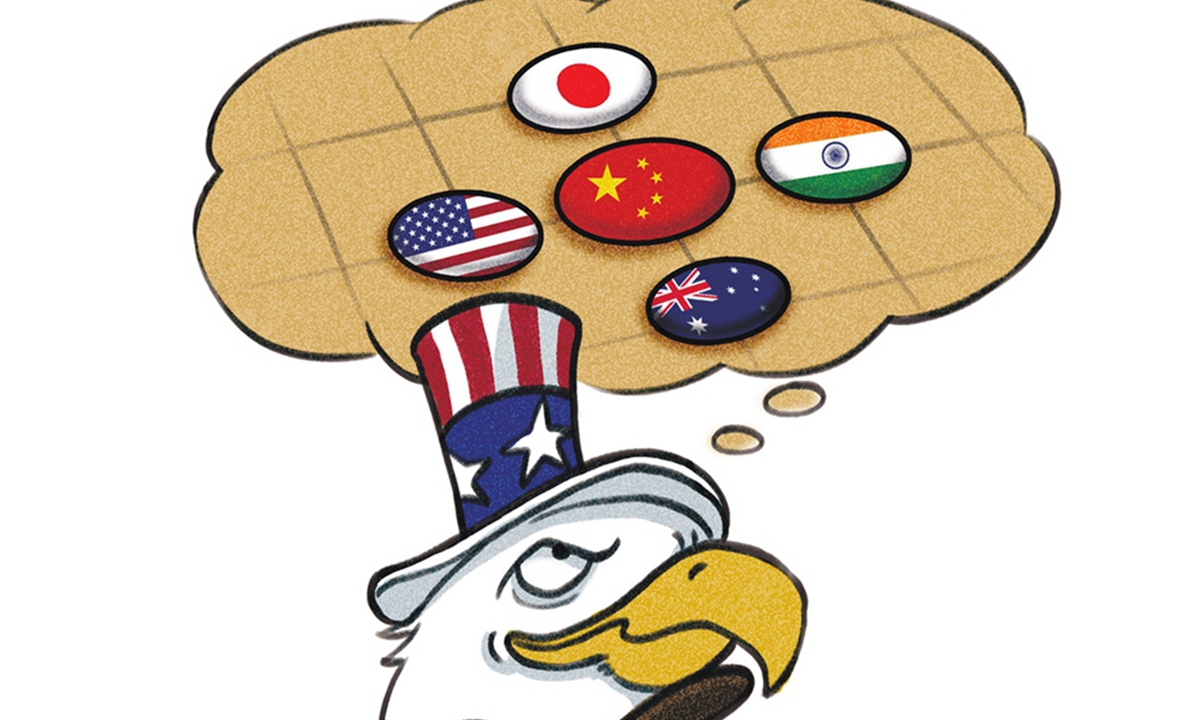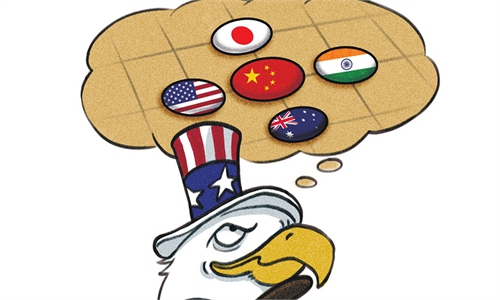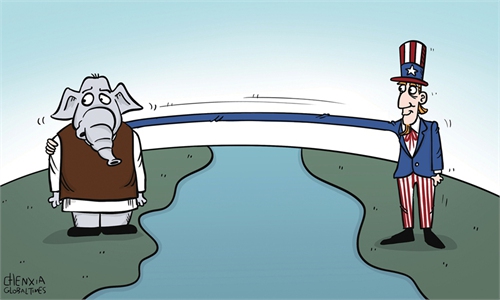
Illustration: Liu Rui/GT
The ambition of the Quad, a US-led regional mechanism aiming to contain China in the Asia-Pacific region, is snowballing in the regional and international arena.
Foreign ministers of Quad countries - the US, Australia, Japan and India - met on the sidelines of the UN General Assembly in New York on Friday local time. This was their first talk since the fourth Quad Foreign Ministers' Meeting on February 11.
In a joint statement, the group reaffirmed that the four countries will continue to deepen multilateral cooperation in support of "advancing a free and open Indo-Pacific, which is inclusive and resilient." In particular, the statement has again emphasized the Quad's "unwavering support for ASEAN unity and centrality, ASEAN-led regional architecture, and practical implementation of ASEAN's Outlook on the Indo-Pacific."
ASEAN is vital to the geopolitical strategy of the quadrilateral mechanism, and it is anticipated that the Quad will work in a way that underlines ASEAN unity and centrality. Yet, to say that the Quad genuinely values the role of ASEAN in the region is still far from reality. What the former appreciates more is probably how it can use the latter as a grip in its grand anti-China plan.
An international relations expert, who required anonymity, told the Global Times that by constantly repeating "ASEAN-centric" rhetoric, the Quad intends to gain support for its future actions in the Asia-Pacific region from more regional countries and hedge China's increasingly significant position in Asia-Pacific.
"It proves that the grouping is still adhering to the logic of Cold War thinking and bloc politics," said the scholar.
Despite what has been stated, the Quad is essentially undermining ASEAN centrality. It seeks to dominate the regional economic and security order by forming cliques, especially the ones that exclude China. It not only counters the will of most countries in the region, including ASEAN members, but also might further destabilize the regional situation.
However, what truly makes Quad Foreign Minister's Friday statement stands out is their commitment to promoting a comprehensive UN reform agenda, including the expansion of permanent and non-permanent seats of the UN Security Council.
The Quad was established as a security dialogue at the beginning, and it has gradually been shaped into an organization involving cooperation in multiple spheres. The urge for a UN reform can be considered a breakthrough for the group, as it is more evident than ever that the Quad countries hope for a bigger say in the global community. They hope such a reform can be conducted based on the goals set by the Quad, proving their impact on a larger scale.
The interests of the four countries in expanding UN Security Council permanent seats are basically the same. Japan and India are both quite eager to become permanent members of the Security Council. Supposing that, it will benefit the US and Australia, especially the former. After all, Washington has been hoping to push more of its allies and partners to join the Security Council to limit Beijing and Moscow's influence and veto power.
Nonetheless, it is difficult for the Quad to move forward with the UN reform agenda. First, though there is a preliminary consensus for reform within the group now, there is no consensus on issues such as how to reform specifically. What's more, India and Japan still face considerable controversy, even doubts, and opposition from other countries if they want to gain permanent seats in the Security Council.
The reform of the Security Council is also not an easy matter. Questions, such as the definition of the terms of reference among member states and whether to retain the veto power, need careful deliberations and are likely to remain pending for a long time. Overall, Quad's ambition is impossible to become a reality at this stage.
Since the reactivation of the Quad, several summits at the level of leaders and foreign ministers have been held. But no matter what kind of cooperation, the momentum of quadrilateral cooperation sounds huge, while few actual projects are actually implemented.
Zhang Tengjun, deputy director of the Department for Asia-Pacific Studies at the China Institute of International Studies, believes the Quad has many internal problems. For instance, these four countries share few resources and willingness to provide public goods to the region. They have set up a working group to address supply chain issues, but no specific plan has been made due to the lack of consensus on a deeper level. It is afraid the Quad's ambitions, be they regional or international, will lead nowhere.



